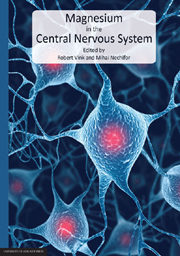Book contents
- Frontmatter
- List of Contributors
- Preface
- Contents
- Section 1 Magnesium in Normal Brain
- Chapter 1 Free magnesium concentration in human brain
- Chapter 2 Intracellular magnesium homeostasis
- Chapter 3 Magnesium transport across the blood-brain barriers
- Chapter 4 Intracellular free Mg2+ and MgATP2− in coordinate control of protein synthesis and cell proliferation
- Chapter 5 Magnesium and the Yin-Yang interplay in apoptosis
- Chapter 6 Brain magnesium homeostasis as a target for reducing cognitive ageing
- Section 2 Magnesium in Neurological Diseases
- Section 3 Involvement of Magnesium in Psychiatric Diseases
Chapter 5 - Magnesium and the Yin-Yang interplay in apoptosis
from Section 1 - Magnesium in Normal Brain
Published online by Cambridge University Press: 05 June 2012
- Frontmatter
- List of Contributors
- Preface
- Contents
- Section 1 Magnesium in Normal Brain
- Chapter 1 Free magnesium concentration in human brain
- Chapter 2 Intracellular magnesium homeostasis
- Chapter 3 Magnesium transport across the blood-brain barriers
- Chapter 4 Intracellular free Mg2+ and MgATP2− in coordinate control of protein synthesis and cell proliferation
- Chapter 5 Magnesium and the Yin-Yang interplay in apoptosis
- Chapter 6 Brain magnesium homeostasis as a target for reducing cognitive ageing
- Section 2 Magnesium in Neurological Diseases
- Section 3 Involvement of Magnesium in Psychiatric Diseases
Summary
Abstract
Apoptosis is a distinctive feature in the physiology of the developing brain, but also a key event in pathological conditions of the adult brain. The basic mechanisms executing cell death by apoptosis are conserved among different tissues and in different conditions, while the initiating event(s) may be more specific. Magnesium appears to be an important player in the process, though it might exert opposite actions depending on extra/intracellular availability. Extracellular magnesium deficiency induces apoptosis, mainly through increased oxidative stress, while intracellular magnesium mobilization from intracellular stores and consequent increase of cytosolic free magnesium seem to act in the effector phase. The molecular mechanism and the physio-pathological meaning of these findings await further characterization. The issue is even more complex in the context of the brain, where many concurring factors may determine a pro- or anti-apoptotic environment. A deeper understanding of the yin-yang role of magnesium in apoptosis may cast light on the basic processes that regulate cell fate, and consequently may open up novel opportunities for a successful therapeutic intervention for all the pathological conditions where excessive and undue apoptosis takes place.
Cell death by apoptosis
Multicellular organisms maintain their homeostasis thanks to a tightly regulated mode of cell death. Programmed cell death, or apoptosis, is an internally controlled suicide program consisting in a stereotyped sequence of biochemical and morphological changes that allow the cell to die without adversely affecting its neighbors, i.e. without causing inflammation.
- Type
- Chapter
- Information
- Magnesium in the Central Nervous System , pp. 85 - 98Publisher: The University of Adelaide PressPrint publication year: 2011
- 3
- Cited by

